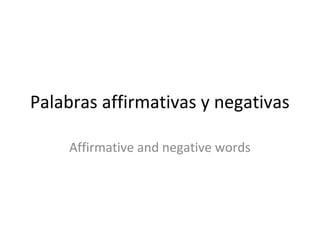
Palabras affirmativas y negativas
- 1. Palabras affirmativas y negativas Affirmative and negative words
- 2. Aquí están… Affirmativas Negativas Alguien (someone) Nadie (no one) Algo (something) Nada (nothing) Algún,Alguna, Algunos, Algunas (some, any) Ningún, Ninguna, Ningunos, Ningunas (no, none, not any) También (also, too) Tampoco (neither, either) Siempre (always) Nunca (never)
- 3. Alguien/Algo • Both treated as “él” if they are the subject and the verb is in need of conjugation. • Ex: Alguien compra todos los pasteles. – Someone’s buying all of the cakes. • Ex: Algo está en este cuarto. – Something is in this room.
- 4. Siempre/También • Used to add emphasis to a sentnece; cam be placed either at the beginning or the end. • Ex: Siempre hago la tarea. • Ex: Juana canta muy bien como siempre. • Ex: También, tengo sueño. • Ex: Tengo miedo también.
- 5. algún/alguna/algunos/algunas • Are used before nouns as adjectives. MUST MATCH IN GENDER & NUMBER. • Ex: ¿Hay algunos estudiantes que quieren participar? • Ex: Algunas reglas de la escuela son tontas.
- 6. Nadie/Nada • Both treated as “él” if they are the subject and the verb is in need of conjugation. • If not used before the verb, a “no” is required before the verb. • Ex: Nadie está aquí. –or- No está nadie aquí. • Ex. Yo no tengo nada.
- 7. Nunca/Tampoco • Used to add emphasis, can be placed at the beginning or the end… HOWEVER if placed at the end, a “no” is required before the verb at the beginning. • Ex: Nunca tengo la tarea. –or- No tengo la tarea nunca. • Ex. Tampoco quiero ir. –or- No quiero ir tampoco
- 8. Ningún/ninguna/ningunos/ ningunas • Are used before nouns as adjectives. MUST MATCH IN GENDER & NUMBER. • Require a “no” before the verb when used in a sentence. • Ex: No hay ningún estudiante que quiere participar. • Ex: ¿No tenemos ninguna tarea?
- 9. Importante entender sobre las palabras negativas. • With negative words the sentences will often translate to sound like bad grammar in English. • Ex: No tengo nada. I don’t have nothing. (I don’t have anything) • As your English teacher may cringe, this is actually good Spanish. Double negatives are good!!!!!
- 10. Importante entender sobre las palabras negativas. • With negative words the sentences will often translate to sound like bad grammar in English. • Ex: No tengo nada. I don’t have nothing. (I don’t have anything) • As your English teacher may cringe, this is actually good Spanish. Double negatives are good!!!!!
